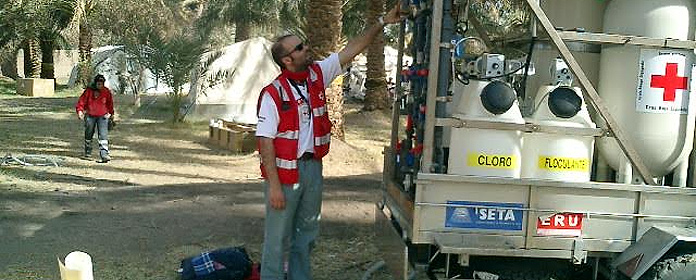"Biology has helped me to specialize in a sector core topic in countries on development: water, sanitation and hygiene promotion."
Joaquín Mencos (Biology '98) linked his life to the emergency financial aid and the University provided him with the training basis to develop his degree program

Joaquín Mencos (Biology '98) had cooperation "in his blood" as he descended from a long line of "cooperants" involved in the creation of the Spanish Red Cross in 1864. His training as a biologist has also given him the opportunity to dedicate his professional life to this subject through specialization in the management of water and sanitation in humanitarian emergencies. Now dedicated to a family business , his links with the values of solidarity rest in part on the training he received in the classrooms of the School of Sciences of the University of Navarra.
How did your connection with financial aid begin at development?
I think it was during the last course of the degree program, in 1998, when I saw the advertisement of a course on Water and Sanitation in Emergencies in the noticeboard of announcements of the School. I signed up with interest because I had already been collaborating very actively with the Red Cross of Navarra for ten years. It seemed to me that in this course I could find a link between my university programs of study and financial aid Humanitarian. And so it happened: it was an introductory course, eminently practical and although not many students attended, Dr. Los Arcos -who coordinated it- infected us with the desire to work in this sector. He also pushed us, to the extent of our possibilities, to use our knowledge as biologists to work for the most needy.
When did your work start with the Red Cross?
The following year I went on a humanitarian mission statement financial aid with the International Red Cross. It was an operation in the Balkan war. In this region I worked for seven months as a health delegate in an emergency medical transport training program. When I finished, I was selected as head of the Red Cross Delegation in the Sahara, where I stayed for a year. In addition to working with many humanitarian financial aid distribution programs, I collaborated in the storage and distribution of the water we produced with a water purification and desalination truck.
Was that the starting point for your orientation towards management water and sanitation in natural disasters?
That's right. In 2001 the Spanish Red Cross launched the first Emergency Response Unit for water and sanitation and I participated in training course. After finishing it, I became manager of the training in response to national and international emergencies of the Spanish Red Cross. There, with the coordination of several groups and the Spanish Water Treatment Society (SETA), we improved the design of the emergency water treatment plant, making it more powerful and transportable, factors core topic in emergency situations.
In 2003 I went to India. At Christmas of that year, when I was in Pamplona visiting my family, the Bam earthquake occurred in Iran, where we verified for the first time that our water and sanitation unit allowed us to have water in the required quantity and quality. This mission statement was followed by others: the floods in Kenya 2004, the tsunami in Indonesia in 2005, the floods in Haiti and the earthquake in Indonesia, also in 2005... In 2015 I moved as team leader of the first rotation in the Red Cross mission statement on the occasion of the Ebola epidemic in Africa. Here we were integrated into a basic health care unit.
At the same time, you never stopped training.
The training is essential in a work that demands a constant specialization . In 2004 I did a master's degree in Hydrology and in 2008 another Master's Degree in Water Engineering, as well as training at management, an MBA and a postgraduate degree in Management and management at ESADE.
What did training give you as a biologist on the development of your degree program?
Biology has given me the technical knowledge base necessary to specialize in one of the sectors that causes the most morbidity and mortality in development countries: water, sanitation and hygiene promotion. However, degree program and the practices that are carried out teach us to always ask ourselves why, to look for the root causes of the problems that arise, in order to find the real solutions.
And what makes the difference of studying Biology at the University of Navarra?
At degree program you don't just learn theory or internship. The academic training brings development to the person. In my case, it also brings two values that I consider fundamental: service and solidarity. This makes it easier for student to awaken concerns and a sense of responsibility to put the knowledge acquired to the benefit of those who need it most.
